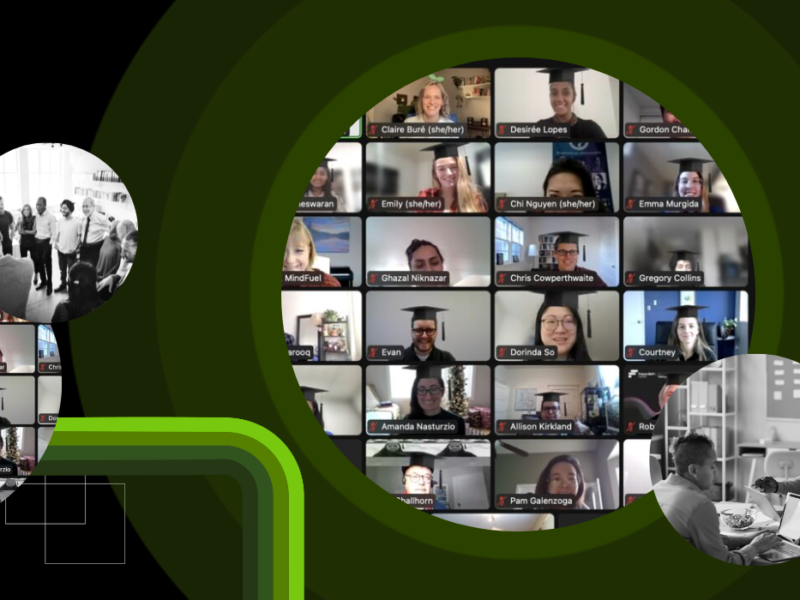Trust and openness strengthen outcomes with FSC partners

Enhancing skills and supporting skills training is a key element of the mission of the Future Skills Centre (FSC). Our projects involve more than 10,000 participants across Canada who are seeking to gain new and different skills to prepare for the workforce of the future.
In many cases, our project partners are seeking technical assistance (TA) to support them as they work to provide skills training and upgrading in a wide range of sectors and industries. Given the increased role that technology and digitization are playing in all aspects of our lives, we are pleased to be able to come alongside our partners, share expertise and offer that support.
Technical assistance is a key initiative that is enabling FSC to move beyond a financial relationship to become a trusted funder-partner with our projects, collaborating to understand their challenges and progress and generating deeper learning about issues and opportunities within skills development. We leverage our unique national network to facilitate connections across the country and ecosystem, reducing time and cost among projects by providing scalable support services to the entire portfolio.
We provide necessary TA to our project partners to simplify compliance and help them execute their projects superbly, leverage evidence and share lessons learned and best practices. We document learning, research, evaluation and knowledge mobilization through direct support, peer exchange groups, expert guidance and the facilitation of connections and coaching. Our four pillars are direct support, peer exchange, expert guidance and external coaching.
The feedback from our project partners so far has been positive. Our first bi-annual anonymous evaluation survey revealed that 94% of project partners would recommend FSC as a funder-partner to another organization. That is a tremendous vote of confidence in the quality of our work and our approach. The same survey revealed that 76% of project partners reported that our technical assistance services helped them achieve their project objectives extremely well or very well.
Strong relationships add value to technical assistance efforts
We are working towards deeper learning and knowledge, and this involves tapping into the wisdom and resources of our consortium partners, who can provide valuable guidance to the projects. This support, which is catalyzed by building strong relationships and developing deep project knowledge, adds enormous value to the skills development ecosystem across Canada.
In the past, when working with organizations that were receiving public funds, we found there could be a hesitancy in being candid with funders, a fear that disclosing anything not working completely as it was first envisioned risked loss of support. However, when one is testing innovation, things don’t always go like clockwork, and there will sometimes be shortcomings between a grantee’s stated goal and the results.
One of FSC’s principles is collaboration, and we have built trusted relationships with project partners. That trust, openness, learning, and sharing of challenges is strengthening outcomes as we test and innovate around skills development. We are working to create an environment where challenges and best practices can be shared and are treated as opportunities for learning. We encourage our project partners to share with us what is not working, and that candour is welcome.
Project partners and FSC collaborate to solve problems
The relationship that FSC staff has with the project partners can unlock ways to solve a problem or challenge and share information so that we can give them guidance on or connect them to our consortium partners.
For instance, we piloted three peer exchange meetings with a total of 24 participants in November. Attendees discussed project challenges and opportunities and the discussion focused on recruitment, retention, building partnerships and engaging industry partners and employers.
In the first quarter of 2021, we received 177 requests for expert guidance, and 96% of those have been addressed.
The feedback we have received from project partners about the TA aspect of our work has been overwhelmingly positive. Here are some of the comments:
- “The FSC team has been amazing with helping us through problems and challenges while offering innovative solutions, to create important linkages to like-minded organizations and people.”
- “As an organization working in complexity and evolving our working hypothesis and approach as we go, we find it is extremely helpful to have a funding partner that not only has patience for the approach, but is encouraging.”
- “Overall, I have personally enjoyed working with FSC. It has structured a very supportive environment for us as grantees, providing resources and critical feedback. FSC has also made accommodations to the program and deadlines as we have rolled out our project – this has been very much appreciated.”
We continue to evolve and validate our TA model and the value it adds. We will work on improving our intake, tracking, and triaging of TA needs and providing more integrated support. We are working to create and leverage knowledge to maximize the impact of the projects. This involves not only direct support of FSC staff but also peer exchange among project partners and facilitating access to the consortium and other expert guidance. We are very excited to share lessons learned, supporting projects so that they will have an impact, meet their learning goals and pass on that knowledge to benefit people across the country.
Cheryl Gordon and Aytaj Pashayeva are programs managers at the Future Skills Centre.
The views, thoughts and opinions expressed here are the author’s own and do not necessarily reflect the viewpoint, official policy or position of the Future Skills Centre or any of its staff members or consortium partners.




